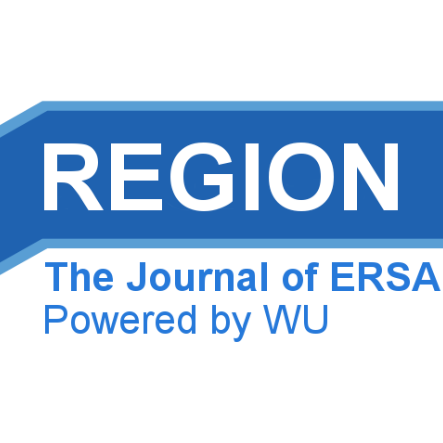Financial Development and Human Development in Nigeria
DOI:
https://doi.org/10.18335/region.v10i1.422Abstract
This study examines the relationship between financial development indicators and human development in Nigeria from 1990-2019. It investigates the effect of broad money supply/Gross Domestic Product (GDP) on Human development; it examines the impact of credit supply/GDP on human development and assesses the link between market capitalization and human development. The study employs expo-facto research design and Autoregressive Distributed Lag to examine the relationship between Financial Development and Human Development. Previous studies in Nigeria had focused on financial development and economic growth, financial deepening and economic growth. Therefore, this study is a response to the dearth of relevant empirical studies on financial development and human development in Nigeria. From the results, the long run net effect of broad money supply/GDP on human development is negligible and positive. M2/GDP in Nigeria only account for the extent of monetization rather than financial intermediation. The long run net effect of credit supply/GDP on human development is negligible and positive. The long-run effect of M2/GDP, CPS/GDP are statistically significant but has no power to substantially influence human development in Nigeria. The study suggests that banks should effectively perform their intermediation roles and effort should be made by the policy makers to widen/broaden the Nigeria capital market activity. Policy makers should concentrate on financial system and their roles for effective money supply and credit supply while implementing economic policies.

Downloads
Published
How to Cite
Issue
Section
License
Copyright (c) 2023 Mutiu Adeniyi Afolabi, Bosede Akanbi, Onifade Emmanuel Olayinka

This work is licensed under a Creative Commons Attribution 4.0 International License.
REGION is an open journal, and uses the standard Creative Commons license: Copyright We want authors to retain the maximum control over their work consistent with the first goal. For this reason, authors who publish in REGION will release their articles under the Creative Commons Attribution license. This license allows anyone to copy and distribute the article provided that appropriate attribution is given to REGION and the authors. For details of the rights authors grant users of their work, see the "human-readable summary" of the license, with a link to the full license. (Note that "you" refers to a user, not an author, in the summary.) Upon submission, the authors agree that the following three items are true: 1) The manuscript named above: a) represents valid work and neither it nor any other that I have written with substantially similar content has been published before in any form except as a preprint, b) is not concurrently submitted to another publication, and c) does not infringe anyone’s copyright. The Author(s) holds ERSA, WU, REGION, and the Editors of REGION harmless against all copyright claims. d) I have, or a coauthor has, had sufficient access to the data to verify the manuscript’s scientific integrity. 2) If asked, I will provide or fully cooperate in providing the data on which the manuscript is based so the editors or their assignees can examine it (where possible) 3) For papers with more than one author, I as the submitter have the permission of the coauthors to submit this work, and all authors agree that the corresponding author will be the main correspondent with the editorial office, and review the edited manuscript and proof. If there is only one author, I will be the corresponding author and agree to handle these responsibilities.




